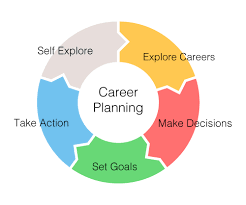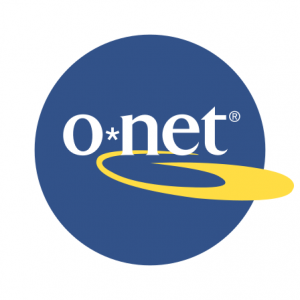Career Exploration
When thinking about what career field to go into, there are many things that can be helpful to consider, such as your career interests, skills, values, and personality characteristics. One thing that is certain is that a major does not equal a career. This means that just because you are majoring in a specific field does not necessarily mean you have to take the path of becoming an expert in that field. For example, a student majoring in psychology may become a Psychologist or they may seek out jobs in related fields like community service, health education, human resources, teaching, guidance counseling, social work, etc. This is the case for any major you come upon.
Ultimately……
Major + GPA + Work experience + Leadership + Study abroad + Organization involvement + Skills + …… = A JOB
Job 1 + Job 2 + Job 3 + ….. = Your CAREER
It is important to recognize that career exploration is a cyclical, rather than a linear, process. It involves knowing yourself, exploring your options, choosing directions, making plans, and taking action. You might find yourself going through these steps in order, or jumping around a bit. Any way you go through these steps is okay and a normal part of the process!
The following are questions you might ask yourself to begin reflecting on yourself:
- What classes have you really enjoyed in the past (high school and/or college)?
- What topics tend to catch your eye when scrolling through the news, looking for a new book to read, or finding a new TV show/movie to watch?
- What skills do you find you are good at? Not so good at?
- How do you spend your free time?
- What type of work experience (paid or volunteer) do you have? What did you like/not like about each job?
- What career fields have you considered in the past? Why did you consider these particular career fields?
- What characteristics would an ideal job have? (i.e., working with people, working for self, level of structure, project oriented, working inside/outside, stability, etc.)
- What do your family members do for a living? How have their experiences influenced your thoughts on career?
In order to better explore your interests and major/occupation options, check out the resource Focus 2 Online Career Self-Assessment and Planning Program.
Focus 2 is a self-paced, interactive career planning program designed to help you explore college majors and plan your career based on your interests, values, skills, personality, and professional goals. It is provided free of charge for currently enrolled Texas A&M students.
For First-Time Users, please log into the University Health Services Appointment Portal to retrieve the access code found on the homepage of the portal. Then you can create a new user account using your Texas A&M University email address. For Returning Users, please sign in to Focus 2.
Additionally, O*NET Online at is a great resource to learn more about specific occupations, such as necessary knowledge, skills, work activities, work values, wages and employment, and related occupations.
- Generate a list of occupations that best fit your interests, values, skills, personality, and career goals.
- Create a Top 10 list of occupations you feel are worth further investigation.
- Talk with people who are actually employed in the occupations you are interested in to gain a better sense of what a day in the job looks like.
- Meet with a Career Advisor through the TAMU Career Center to further explore your career options.
- Attempt to gain first-hand experience in work settings of interest through volunteer work, part-time or summer employment, internships, externships, job shadowing, or cooperative education. Visit TAMU’s Career Center website to learn more about these opportunities.
- Decide which career to purse.
- Meet with your Academic Advisor to discuss your degree plan as it relates to the career field you have selected.
College Academic / Career Checklist
Academic - Explore the University
- Review the undergraduate catalog
- See an academic advisor
- Meet your professors
- Observe classes you may be interested in (requires permission)
- Identify major fears about college life
- Take core curriculum and at least one exploratory class per semester
- Explore resources through the Academic Success Center, such as tutoring schedules, Academic coaching, and Supplemental Instruction
- For students who live on-campus, talk to a TAMU Academic Peer Mentor
Career - Explore Career Areas
- Talk with advisors and professors about career options
- Identify past accomplishments, skills & abilities, career related hobbies, and career values
- Talk with a counselor at University Health Services about career exploration
- Take an interest and/or personality inventory at University Health Services
- Join professional organizations
- Nurture hobbies
- Investigate Cooperative Education, internships, or other career-related employment
Academic - Gain Specific Information
- Seek academic advice
- Focus on obtaining a high GPR
- Choose a major if you have not done so already
- Develop a tentative degree plan
- Talk with others in your major
- Consider Study Abroad or co-operative education
Career - Collect More Information
- Learn about specific careers of interest to you
- Talk with professionals
- Develop short-term goals
- Look for summer internships
- Ask to observe the work life of a professional
- Talk with a counselor at University Health Services about career exploration
- Attend career workshops
- Work on a residence hall or club project
- Take on a leadership role in a Student Organization
- Join professional associations
Academic - Make Initial Choices
- Choose electives
- Focus on major courses
- Relate academics to future work plans
- Attend seminars on your major
- Attend relevant conferences
- Develop an academic mentoring relationship
- Complete a degree check
Career - Increase Experience
- Find internships
- Make tentative decisions about a career
- Learn how to write a resume through the Career Center
- Attend grad school seminars
- Develop general awareness of career options
- Become familiar with work settings and job descriptions
- Talk with a counselor at University Health Services about career exploration
- Discuss some of your decisions with a mentor
- Evaluate your major - reassess how marketable it is and investigate areas of specialization
- Set up informational interviews with professionals working in your field
- Secure career-related employment
- Volunteer in a field of interest
Academic - Long-Term Decisions
- Apply to graduate school
- Complete senior project
- Develop an independent study
- Work on research or a project with a professor
- Become a tutor/TA
- Consider life-long learning interests
- Attend relevant conferences
Career - First Career Choice
- Attend workshops on job search, interviewing, recruiting, mock interviews, applying to grad school, and stress management
- Establish life goals
- Develop contact list
- Attend grad school seminars
- Check job listings
- Interview for jobs
- Prepare yourself for your chosen lifestyle
- Talk about your first year out of school
- Make a list of your firm decisions


